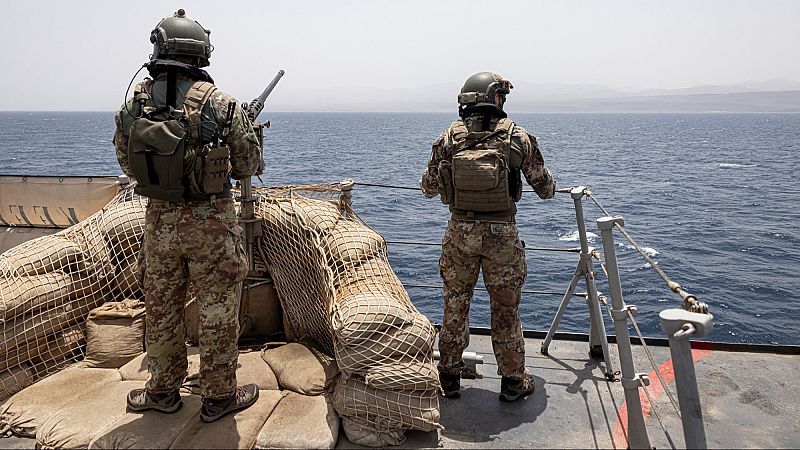
European officials have so far kept mum on comments by top US government officials in a private chat that Europe is "free-loading" in the Red Sea, despite spending millions of euros in the past year protecting commercial vessels from Houthi attacks.
Twenty-one EU member states have for the past 13 months taken part in Operation ASPIDES to protect commercial shipping in the Red Sea at a common cost of €8 million, with participating governments footing the bill for their own assets and personnel deployed in the area on top.
The mission was launched in February 2024 for an initial one-year period in response to Iran-backed Houthi rebels in Yemen launching missile and drone attacks on commercial ships following the start of Israel’s offensive against the Gaza Strip in response to deadly attacks by Hamas terrorists against Israel on 7 October.
It was extended last month for another year with the cost for common command structures including Operation HeadQuarters, Force Headquarters, and Command and Control systems, expected to rise to €17 million.
'I just hate bailing Europe out again'
Yet, US Defence Secretary Pete Hegseth said in a leaked Signal chat created in the days leading up to US strikes on Houthi targets in Yemen, which the US National Security Council said "appears to be authentic", that Europe is "free-loading" in the Red Sea.
Vice President JD Vance, who questioned the necessity of launching strikes arguing it would benefit Europe more than the US and that it would be difficult to explain to an American audience, meanwhile said: "I just hate bailing Europe out again".
The group chat, to which the editor-in-chief of The Atlantic appears to have been mistakenly added, then sees someone writing under the initials "S M", believed to be Deputy White House chief of staff Stephen Miller, say that Washington intends to "make clear to Egypt and Europe" that they expect something in return.
"If the US successfully restores freedom of navigation at great cost there needs to be some further economic gain extracted in return," S M states.
Several EU countries participating in ASPIDES contacted by Euronews declined to comment on the leak and its content or referred us to the European Union's External Action Service (EEAS), which Euronews also contacted.
700 merchant vessels protected
For Emily Tasinato, a pan-European fellow at the European Council on Foreign Relations (ECFR), a Brussels-based thinktank, "the fact that Trump’s cabinet referred to Europe as 'freeloaders' is hardly surprising given that Trump has repeatedly accused European partners of free riding on US military power."
The US president has for instance called on European NATO allies to significantly up their defence spending, implying Washington could refuse to aid an ally under attack if that ally doesn't spend enough on defence.
ASPIDES, Tasinato said, has so far "played a key role in ensuring the safe passage of ships and in intercepting Houthi drone and missile attacks" with a "somewhat positive" impact on freedom of maritime navigation in the region.
According to the EU Naval Force, ASPIDES, which has an average of three frigates deployed at all times, has intercepted four anti-ship ballistic missiles, 18 aerial drones and two sea drones and provided support to over 700 merchant vessels. Of these, more than 410 ships received close protection, benefiting from active escort services and surveillance.
The defensive mission has also rescued nearly 50 seafarers and helped prevent a major environmental and humanitarian disaster following the August 2024 attack on the MV Sounion oil tanker.
Tasinato however said that ASPIDES is not "having a truly incisive role" because of "challenges in effectiveness and operational aspects" and because its "narrow focus has led to a short-term defensive strategy that, while valuable, lacks a broader, more comprehensive plan for addressing the Houthi threat and restoring pre-crisis freedom of navigation".
'New types of wars could not be easily won'
Washington said last week's strikes were in retaliation for years of Houthi attacks against "US ships and other nations" and the ongoing disruption to commerce with US warships and commercial vessels respectively targeted 170 and 145 times since 2003.
The Pentagon said the strikes targeted Houthi training sites, unmanned aerial vehicle infrastructure, weapons manufacturing capabilities and weapons storage facilities.
Chief Pentagon Spokesman Sean Parnell told reporters that "there is a very clear end-state to this operation, and that begins the moment that the Houthis pledge to stop attacking our ships and putting American lives at risk".
"This campaign will be relentless to degrade their capability and to open up shipping lanes in the region and to defend our homeland," he added.
Both Tasinato and George N. Tzogopoulos, a senior fellow at the Hellenic Foundation for European and Foreign Policy, another thinktank, concur that the US's purely military approach, just like the EU's defensive stance so far, is unlikely to yield a lasting solution.
"Will a deeper military engagement solve the multidimensional Middle East crisis and the Red Sea imbroglio that is part of it? Perhaps yes, but experience suggests that new types of wars could not be easily won," Tzogopoulos told Euronews.
"It's quite significant to remember that the roots of the problem lie not only in the Israel/US-Iran hostility but also in the diachronic non-resolution of the Palestinian Question," he added.






